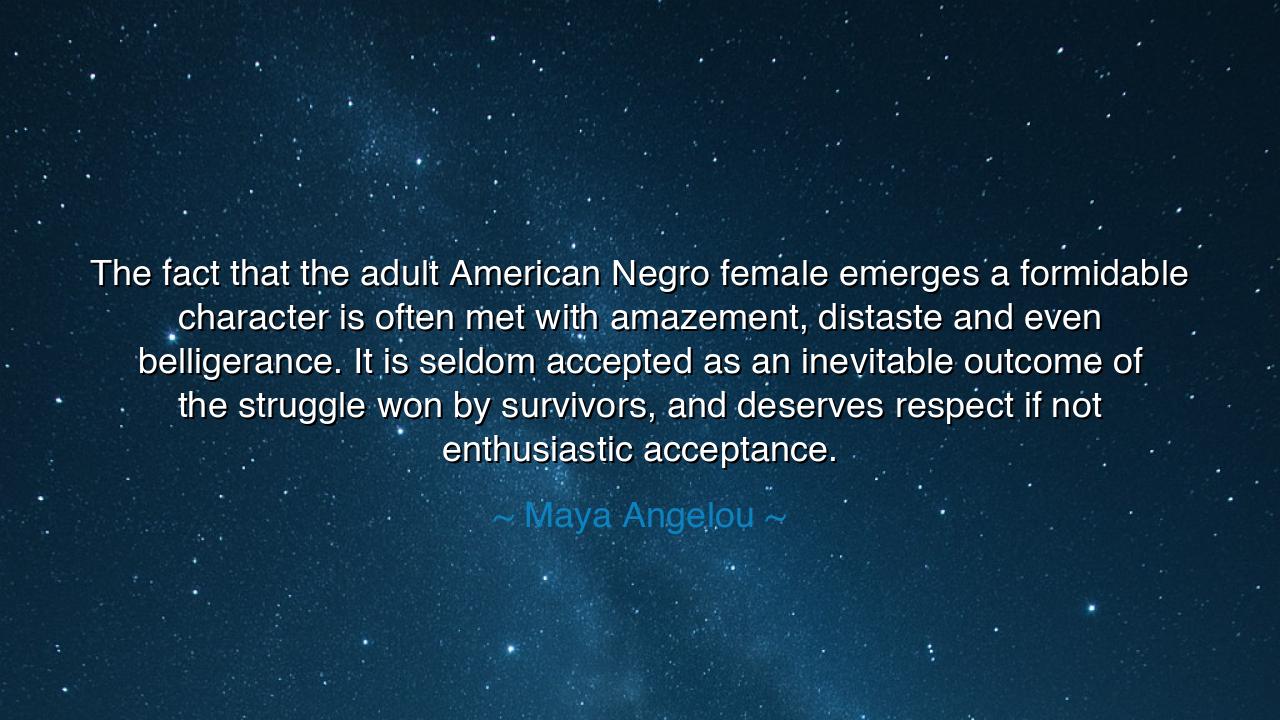
The fact that the adult American Negro female emerges a
The fact that the adult American Negro female emerges a formidable character is often met with amazement, distaste and even belligerance. It is seldom accepted as an inevitable outcome of the struggle won by survivors, and deserves respect if not enthusiastic acceptance.






In the powerful words of Maya Angelou, “The fact that the adult American Negro female emerges a formidable character is often met with amazement, distaste and even belligerance. It is seldom accepted as an inevitable outcome of the struggle won by survivors, and deserves respect if not enthusiastic acceptance.” we find an eloquent statement on the resilience and strength of Black women in America. Angelou, in her characteristic style, is not only speaking about the societal dynamics surrounding race and gender but is also acknowledging the endurance and wisdom forged through centuries of oppression and struggle. This formidable character, which has emerged from the hardships of systemic racism and gender inequality, is often misunderstood, even feared, by those who do not understand its origins. Yet, as Angelou so astutely points out, it deserves respect, if not admiration.
The origin of this quote arises from Angelou’s deep understanding of the historical and social context in which Black women have lived and thrived. Throughout history, the American Negro female has been subjected to countless injustices, from slavery to discrimination to economic disenfranchisement. And yet, despite the overwhelming weight of these burdens, many Black women have risen, not only to survive but to become formidable forces in society—leaders in the civil rights movement, mothers, artists, intellectuals, and activists. Angelou’s words speak to the powerful legacy of these women and the unspoken struggles they face in a world that still refuses to fully acknowledge their worth and strength.
In the ancient world, we find a parallel in the stories of Persephone and Athena, goddesses who, though subjected to trials and struggles, emerged as symbols of strength and wisdom. Persephone, though abducted and taken to the underworld, returned as a powerful goddess who ruled over both life and death. Athena, born from the head of Zeus, emerged as a deity of wisdom and strategy, a force revered by both gods and mortals alike. These figures, though divine, represent the resilience of women who, through suffering and trial, became symbols of empowerment. Similarly, Black women in America, though subjected to the deepest of social and cultural oppression, have risen to embody a spirit of strength, endurance, and leadership—yet, as Angelou points out, their formidable nature is often met with amazement, distaste, or even hostility.
Consider the life of Sojourner Truth, a woman who, born into slavery, became one of the most prominent figures in the fight for abolition and women’s rights. In her iconic speech, “Ain’t I a Woman?” Truth not only defied the gender norms of her time but also challenged the oppressive forces of both race and sex. Despite her undeniable strength, her contributions were often minimized or dismissed by those who could not comprehend the magnitude of her struggles. Yet, like Angelou’s assertion, Truth’s formidable character was the direct result of a legacy of survival, a survival that was not merely endured but transformed into a force for social change. Her life, much like Angelou’s own, reflects the deeply rooted struggle for freedom and justice that has shaped the character of Black women in America.
In Angelou’s reflection, we find a profound lesson: that the strength of Black women is not a mere accident or anomaly, but the inevitable result of their history—a history filled with immense hardship, sacrifice, and perseverance. To dismiss the formidable character of these women as something unnatural or unwelcome is to ignore the deep roots from which it springs. Survival in the face of such hardship is not a passive occurrence but an active force that transforms individuals, societies, and cultures. The pride that we feel in the strength of such individuals should be recognized as an acknowledgment of human resilience, and not as something to be feared or rejected.
The lesson for us, as Angelou teaches, is clear: we must acknowledge the strength and worthiness of those who have been marginalized, not only for their own sake but for the healing of society as a whole. Empathy, respect, and recognition of the struggles of others are essential in a world where so many still face systemic oppression. Just as we honor those who have overcome great adversity in ancient myths, so too should we honor those who fight for justice and equality in the present. The stories of these women, from Sojourner Truth to Maya Angelou, must be passed down as a testament to the strength of the human spirit and the power of survival.
In our own lives, we must strive to see and respect the formidable character in those who have faced oppression. Let us honor the Black women and all marginalized groups who continue to carry the weight of their histories, not with pity, but with the respect and recognition they deserve. By doing so, we can help build a world where the strength of others is not feared but celebrated, where the resilience of the human spirit is seen as a source of inspiration for us all. Just as the ancients honored their gods and heroes for their struggles and triumphs, so too must we honor the everyday heroes among us, whose lives have been forged in the crucible of adversity.






AAdministratorAdministrator
Welcome, honored guests. Please leave a comment, we will respond soon